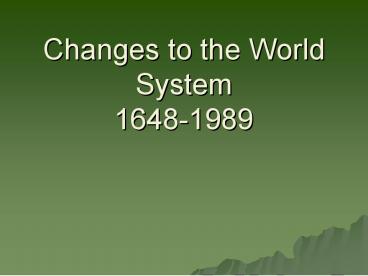Changes to the World System 16481989 - PowerPoint PPT Presentation
1 / 26
Title:
Changes to the World System 16481989
Description:
Isn't it reasonable to help overthrow kingship in Saudi Arabia? ... Predicting Saudi Arabia's energy future is more confusing/uncertain than most think. ... – PowerPoint PPT presentation
Number of Views:53
Avg rating:3.0/5.0
Title: Changes to the World System 16481989
1
Changes to the World System1648-1989
2
Pope Leo III Crowns Charles (Charlemagne) 800AD
3
Napoleon Crowns Himself 1804
4
A Brief Timeline
- Imperialism becomes trendy (1400 to 1900)
- Treaty of Westphalia (1648)
- religious denominations entitled to equal rights
- medieval idea of the unity of western
Christianity abandoned - replaced with sovereign states with equal rights
5
(No Transcript)
6
1500-1800 world civilizations
7
(No Transcript)
8
(No Transcript)
9
(No Transcript)
10
(No Transcript)
11
Classical balance of power system Europe
1648-1789
- Decentralized system
- Commitment to preserve state system/ avoid
hegemony - Small number of relatively equal powers
- Authoritarian governments free of domestic
constraints - Shared culture of Christianity
- Flexible, non-ideological wartime alliances
12
The Old Order Crumbles
- American Revolution and Rise of Liberalism,
Anti-colonialism - French Revolution and the Rise of Nationalism and
Liberalism - Napoleonic Wars (1804-15) and the
end of the balance of power
13
The impact of economic, social and political
changes
- nationalism
- Latin American decolonization, 1805-25
- Norwegian independence, 1814
- Serbian autonomy, 1815
- Greek independence, 1829
- France and the July Monarchy 1830
- Belgian independence, 1832
- Egyptian autonomy, 1841
- Italian unification, 1859-70
- Meiji Restoration, 1868
- German unification, 1871
14
Additional Impacts
- industrialization
- urbanization
- conservatism v. liberalism v. socialism
- role of government
- desire for equity
- WWI and WWII
- expanding governance beyond the nation state
- Collapse of Empires
- Ottoman (1923)
- Austro-Hungarian Empire (1918)
- Qing Dynasty (1912)
15
Colonialism recedes (1960s-1970s)
16
Cold War and rise of alliances (1945-1989)
17
Waves of Democracy
18
(No Transcript)
19
1902
1997
20
How do we explain these changes?
21
Fall of the Soviet Union (1989)
- dissolution of bipolar world
- shift from focus on military
- world order focuses on economic power and
division
22
Economic Power
Military Power
Both economic and military power
ca. 2000
23
Divisions
- Post-WWII 1st/ 2nd/ 3rd world
- Modern
- More developed countries vs. Less developed
countries - North/ South divide
- Based on?
- Economic and political development
24
(No Transcript)
25
Future trends
- Globalization
- McWorld
- Integration
- Regionalism
- security
- Trade
- New Issues
- Sovereignty
- Soft Issues
- (environment,
- human rights)
26
Lasting Post-Westphalian Notions
- Sovereignty
- Interstate
- Intrastate
- No moral wars
- Collective security
- Christianity?































